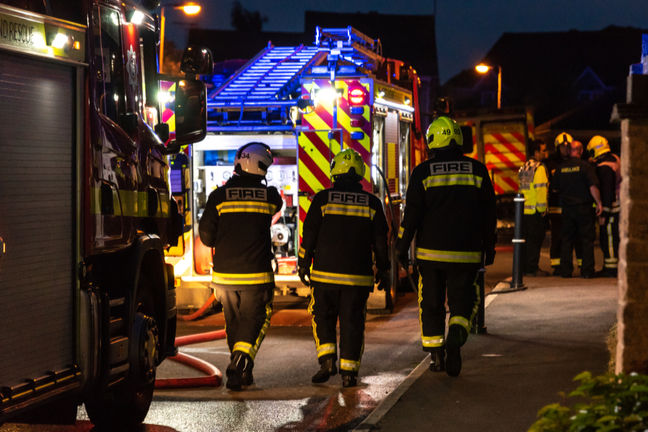Motorola Loses Appeal To Kill Price Cap On UK Airwave Emergency Services Contract

Motorola's appeal against price controls on the longstanding mission-critical Airwave network used by the UK emergency services was dismissed by a tribunal, meaning the cap imposed by the regulator must stand.
The ruling is the latest development in an epic saga over communications for Britain’s emergency services, currently delivered by the Airwave network but set to be replaced by a much delayed successor, the Emergency Services Network (ESN).
Motorola Solutions operates Airwave and was also the original provider for ESN, which caused the Competition and Markets Authority (CMA) to judge it a monopoly provider in October 2022 and propose price controls on the existing platform, as it claimed the lack of competition was allowing Motorola to make excessive profits.
The company appealed against this decision, challenging its lawfulness on two grounds, but the UK's Competition Appeal Tribunal (CAT), a specialist judicial body that handles these cases, has now dismissed both grounds in a judgement published just before the end of 2023.
Motorola's grounds for appeal rested firstly on a claim that the CMA had erred in its approach when it found there was an adverse effect on competition, but also that the regulator had relied on an unlawful "profitability analysis" in reaching this conclusion and drawing up its proposed remedy, namely a cap on charges that are payable by the British government for the communications services.
However, the tribunal unanimously decided against Motorola's arguments, stating in its summary that the CMA had not failed to take into account any relevant consideration. It also judged that the CMA was "entitled to a degree of latitude in how it approached its profitability assessment," and that it had not been irrational or inconsistent in its approach.
The CMA announced its investigation into the Airwave deal in 2021, following a series of delays to its successor, ESN, which was originally due to be introduced by 2019. Due to the delays, Motorola's contract for Airwave was extended in 2020 for six years, which the company admitted at the time could deliver it £1.2 billion ($1.5 billion) in profits.
Motorola then walked away from its £400 million ($508 million) contract for ESN in November 2021, a move that was said to preclude the CMA from ordering it to sell Airwave if it judged that the company held a monopoly position in respect of communications for the emergency services.
The Home Office is going through a procurement process to replace Motorola on the ESN contract and expects to appoint a new supplier sometime this year, but it is now thought the new network will not be ready before 2026, and it may even be as late as 2029 – a decade after it should have been introduced.
The British government has already had to write off £135 million ($157 million) as a consequence of Motorola leaving the program, according to one Home Affairs Committee member.
- £2B in UK taxpayer cash later, and still no Emergency Services Network
- 'There has never been a realistic plan' for UK's £11B Emergency Services Network
- UK watchdog launches full probe of Motorola Solutions' cop-comms deals on Emergency Services Network
- UK's Emergency Services Network unlikely to start operating until 2029
A key part in the CMA's original decision to cap the charges is that the UK taxpayer had already paid for the sunk costs involved in the Airwave network, as it had been in operation for about 20 years.
The CAT judgement notes the CMA deemed it appropriate to impose a charge control remedy in respect of the Airwave network until 2029, which would reduce prices to "significantly below" the contractually agreed prices. The CMA also recommended to the Home Office that it should ensure that "the supply of services in the relevant market" is subject to competitive pricing arrangements by then.
Last year, the Public Accounts Committee (PAC) published a highly critical report claiming there had "never been a realistic plan for ESN" and there was no evidence it would work as well as the current system.
Motorola Solutions told us today it "strongly disagrees with the Competition Appeal Tribunal's decision. It is highly concerning that a regulator can be allowed to tear up, mid-term, a negotiated and mutually agreed binding contract – even more so one with a sovereign government."
It added: "We believe this unprecedented overreach will have a chilling effect on long-term investment and contracting with the UK government. In our decades of operating nationwide public safety networks around the world, we have not seen anything like this."
The software and services provider said it "remains committed to vigorously protecting its contractual position and we are considering all options, including our intent to appeal the decision to the Court of Appeal." ®
From Chip War To Cloud War: The Next Frontier In Global Tech Competition
The global chip war, characterized by intense competition among nations and corporations for supremacy in semiconductor ... Read more
The High Stakes Of Tech Regulation: Security Risks And Market Dynamics
The influence of tech giants in the global economy continues to grow, raising crucial questions about how to balance sec... Read more
The Tyranny Of Instagram Interiors: Why It's Time To Break Free From Algorithm-Driven Aesthetics
Instagram has become a dominant force in shaping interior design trends, offering a seemingly endless stream of inspirat... Read more
The Data Crunch In AI: Strategies For Sustainability
Exploring solutions to the imminent exhaustion of internet data for AI training.As the artificial intelligence (AI) indu... Read more
Google Abandons Four-Year Effort To Remove Cookies From Chrome Browser
After four years of dedicated effort, Google has decided to abandon its plan to remove third-party cookies from its Chro... Read more
LinkedIn Embraces AI And Gamification To Drive User Engagement And Revenue
In an effort to tackle slowing revenue growth and enhance user engagement, LinkedIn is turning to artificial intelligenc... Read more

